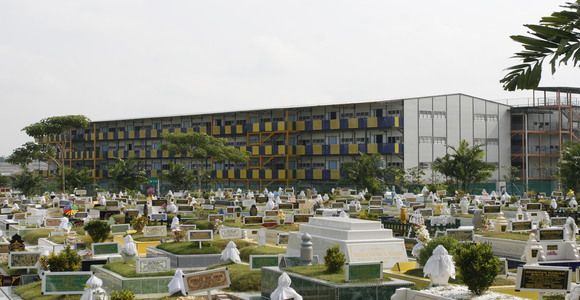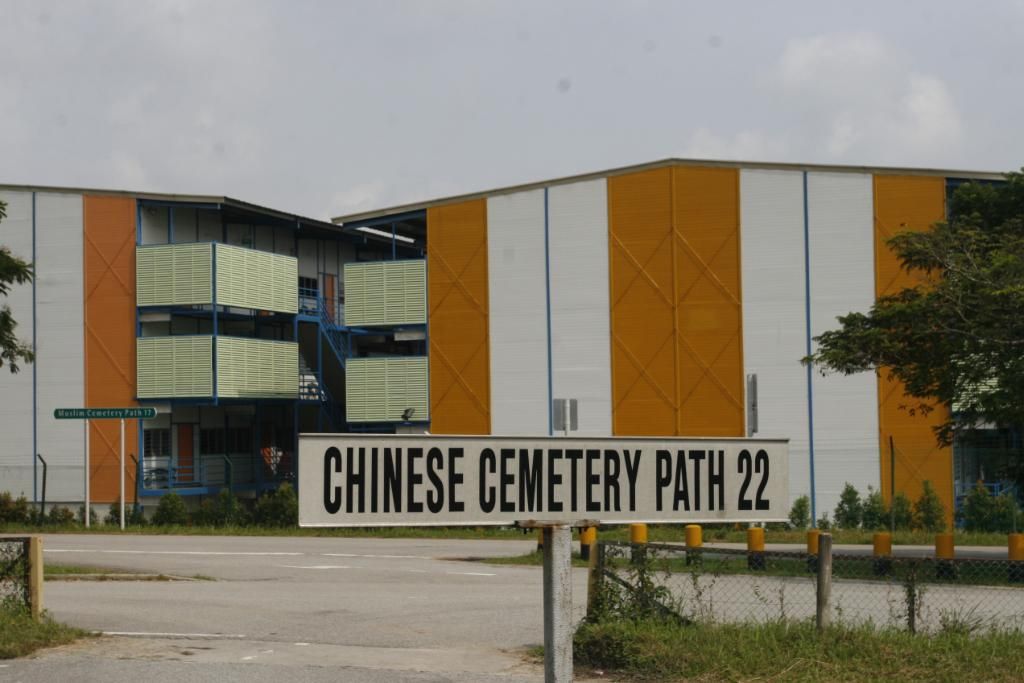
Andrew Loh / Pictures by Damien Chng
Member of Parliament, Ms Irene Ng, asked the Minister for National Development, Mr Mah Bow Tan on 21 October 2008: “Can I ask the Minister whether he agrees that as a decent society, it is our duty to provide the foreign workers in our midst decent and humane housing, so that they can come here and earn an honest wage and not feel like modern-day slave in Singapore?”
In his reply, the minister said, “I think it is important for us to provide proper housing for all our workers, not just from the point of view of humanity, as Ms Ng put it, but also because there are basic standards of fire safety and basic standards of health and sanitation that we need to take into account.”
In light of the above assurances by the minister, it came as a shock to us to see an 8-block, self-contained dormitory situated at the Lim Chu Kang cemetery. It houses 12,000 workers. Called Murai Lodge 1 and Murai Lodge 2, it is tucked away between the Muslim and Chinese burial grounds and the chicken farm.
When The Online Citizen visited the premises, most of the workers were at work. We walked around Murai Lodge 2 and found that there was a canteen there with several stalls, one selling Myanmarese food, and a barber shop and a provision shop. We did not enter the dormitory itself as it was guarded by security guards.
The Online Citizen then contacted the Urban Redevelopment Authority and the Building and Construction Authority. After acknowledging our initial emails and promising to reply to our queries, we have yet to receive any replies from the two departments after a week.
The location of the Lim Chu Kang dormitory smacks of a policy of social isolation for these foreign workers. While one can understand the shortage of space in Singapore to provide housing for these workers, one wonders if siting their living quarters, in an isolated area of Singapore and within a cemetery, with little amenities and with the nearest bus stop some 5 km away, is a “humane” solution which Ms Ng mentioned and which Mr Mah had agreed is a consideration for the government.
“Even if the workers are not superstitious, it sends them a clear signal on where their social position is in our country,” Jolovan Wham, Executive Director of Humanitarian Organisation for Migration Economics (HOME), told the Straits Times (ST). The ST had reported the building of the Murai Lodge dormitory in March 2008 – before it was built.
The government seems to be more concerned about the welfare of new immigrants rather than those of migrant workers.
The Online Citizen has highlighted numerous cases of the atrocious living conditions of these migrant workers, including some who were made to live in cargo containers for months. While the government recently announced a $10 million “integration fund” for new immigrants to “get locals and new immigrants to expand their social circles to include each other”, it seems to have adopted a policy of isolation when it comes to foreign workers, despite telling Singaporeans how important foreign workers are to our economy.
Aren’t these migrant workers just as important as new immigrants? And if so, shouldn’t they be part of this “integration” project? Why leave them among the dead – literally? Is this humane?
In April 2009, Manpower Minister, Mr Gan Kim Yong, when opening the Avery Lodge dormitory, said:
“There have been cases of employers who decided to cut down on the provision of proper housing so as to reduce operating costs. Some do not provide proper sanitation or ventilation, while some squeeze more than the allowed number of people in a room. This is unacceptable.”
One would think that the minister would agree that having a dormitory, literally within a cemetery, is also unacceptable.
The Online Citizen had hoped to have permission from the authorities to visit the inside of the Murai Lodge dormitory and speak to the workers.
But it seems the authorities are keeping mum.
—-







